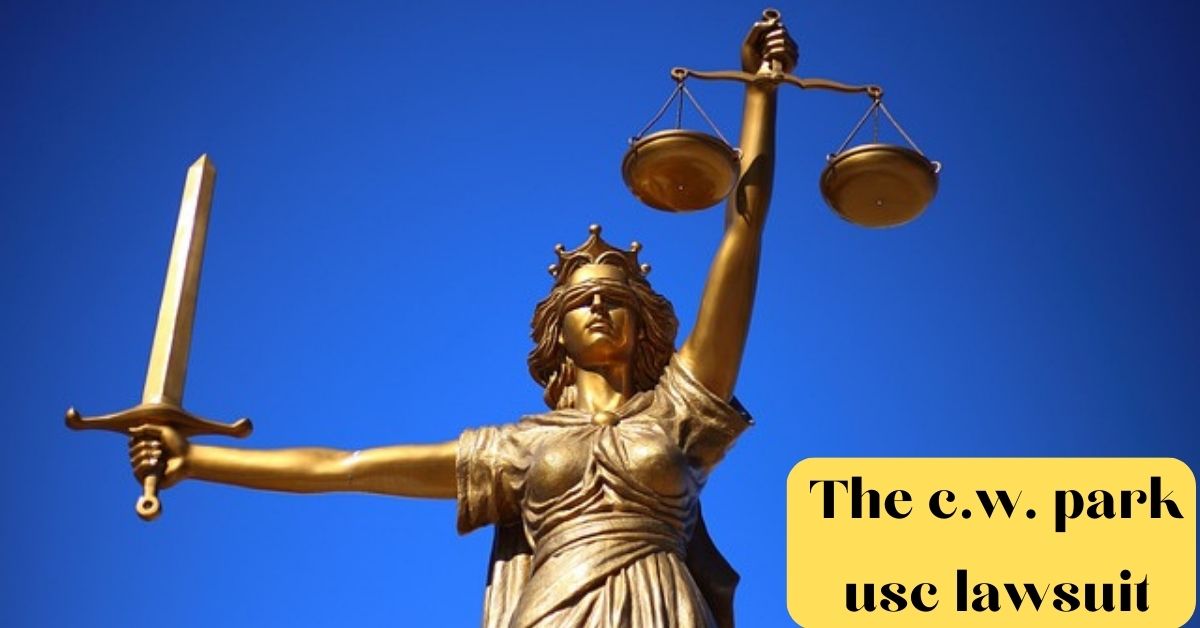Contents
Introduction to the C.W. Park USC lawsuit

Welcome back to our blog, where we dive into the latest and most intriguing stories shaping the world of higher education. Today, we bring you a captivating tale that has rocked one of the nation’s most prestigious universities: the C.
W. Park USC lawsuit. Get ready to uncover all the juicy details surrounding this legal battle and its potential implications for universities nationwide.
Picture this: a renowned professor, an esteemed institution, and misconduct allegations that have sent shockwaves through academia—the C.
W. Park USC lawsuit is not just your average courtroom drama; it delves deep into questions of integrity, responsibility, and accountability within our educational institutions.
So, who exactly is C? W. Park? And what explosive claims have set tongues wagging in academic circles? Join us as we unravel this gripping saga piece by piece!
Who is C?
W. Park, an esteemed professor at the University of Southern California (USC), finds himself at the center of a lawsuit that has sent shockwaves through the academic community.
W. Park, and what exactly does this lawsuit entail?
Park is known for his expertise in marketing research and consumer behavior, with a career spanning over two decades. He has contributed countless scholarly articles to prestigious journals and received accolades for teaching excellence.
The lawsuit alleges that Park engaged in unethical conduct by accepting bribes from certain students in exchange for better grades and favorable treatment. This shocking revelation has raised serious questions about academic integrity and fairness within USC’s esteemed institution.
It is important to note that these are still allegations as the case works through the legal system. USC, on its part, maintains a zero-tolerance policy toward any form of academic misconduct or unethical behavior among faculty members.
If proven true, this scandal could tarnish Park’s reputation and doubt USC’s ability to maintain high standards of education and ethics among its faculty members. The university will undoubtedly face scrutiny regarding its oversight processes and accountability measures.
Students are now uncertain as they question whether their educational experiences may have been compromised by potential favoritism or unfair grading practices. Moreover, it raises concerns about how widespread such issues might be within higher education institutions nationwide.
As details continue to emerge surrounding this contentious lawsuit involving C.
W. Park, universities nationwide must take notice and reflect upon their systems to ensure transparency and uphold ethical standards amidst increasing pressure within academia.
Only time will tell how this case unfolds; nevertheless, it is a stark reminder that no institution can afford complacency when maintaining integrity in education.
Overview of USC’s response to the lawsuit

The University of Southern California (USC) has been quiet in the face of the C.W. Park USC lawsuit. USC has responded to the allegations with a strong and strategic approach.
USC released an official statement acknowledging the lawsuit and expressing its commitment to addressing any issues raised. They emphasized their dedication to providing all students with a safe and inclusive environment.
USC announced it would conduct an internal investigation to demonstrate transparency. This proactive step shows their willingness to get to the bottom of potential wrongdoings and take appropriate action if necessary.
Furthermore, USC actively engages with students, faculty, and alums through various channels, such as town hall meetings and feedback sessions. This open dialogue allows them to listen to concerns directly from those affected by this lawsuit.
Additionally, USC has reinforced its commitment to implementing policies and protocols that promote accountability in handling sexual harassment cases on campus. They have also pledged increased resources for support services available to survivors.
It is important to note that while USC’s response appears comprehensive on paper, it remains crucial for them to follow through on these promises. Only time will tell how effectively these measures will restore trust within the university community.
USC’s response indicates a recognition of its responsibilities as an institution of higher education but leaves room for ongoing scrutiny regarding concrete actions taken moving forward.
Impact of the lawsuit on USC and its students
The impact of the C.W. Park USC lawsuit on the university and its students has been profound. As news of the lawsuit broke, it sparked a wave of concern and uncertainty among current and prospective students.
For many current USC students, this lawsuit has shaken their trust in the institution they once held in high regard. They question whether USC truly prioritizes integrity and fairness or is concerned with protecting its reputation at all costs.
The negative publicity surrounding the lawsuit could also have long-term consequences for USC’s enrollment numbers. Prospective students may be deterred from applying to a university embroiled in legal controversy, especially given the fierce competition among colleges and universities for top-tier applicants.
Additionally, some alumni may feel disillusioned by these recent events. They may think twice before donating or continuing to support an institution facing such serious allegations.
Internally, faculty members at USC are also grappling with how best to address this situation with their students. It can be challenging to maintain focus on academics when there is so much uncertainty surrounding the future of their beloved university.
It cannot be denied that this lawsuit has had far-reaching implications for both USC as an institution and its student body. The true extent of these impacts will only become apparent over time as the legal process unfolds and decisions regarding accountability and reform within the university system are made.
Conclusion:
As the C.W. Park USC lawsuit unfolds, it raises important questions about accountability and fairness within our educational institutions. The outcome of this case will undoubtedly have far-reaching implications for USC and universities across the country.
Regardless of the court’s decision, one thing is clear: universities must prioritize transparency and take swift action when misconduct allegations arise. It is crucial that students feel safe on campus and confident in their institution’s ability to address any wrongdoing.
The c.w. Park USC lawsuit serves as a wake-up call for all universities to reevaluate their internal processes regarding faculty-student relationships and potential abuses of power. By implementing more explicit guidelines and providing resources for reporting misconduct, universities can work towards creating an environment where every student feels supported and protected.
Moreover, this lawsuit highlights the need for ongoing discussions around consent education, power dynamics in academia, and preventing sexual harassment or assault on college campuses. Universities should proactively engage with these topics to foster a culture of respect, equality, and safety.
While it is impossible to predict precisely what the outcome of this case will be or how it will impact other universities facing similar challenges, one thing is sure – change needs to happen. Institutions must recognize their responsibility in shaping academic experiences and personal well-being.
Good luck, Habibi!
Come to the website and explore some mind-blowing content.
- Why Every Fashionista Needs a pork pie hat in Their Wardrobe

- Ultimate Guide to Shopping for parachute pants: Where to Buy, What to Look For

- Exploring the Delicate Flavors of tagliolini Pasta: A Culinary Journey

- Uncovering the Truth Behind blog del narco: A Deep Dive into Mexico’s Drug War

- Exploring the History and Tradition of cempasuchil in Day of the Dead Celebrations

- The Ultimate Guide to boquerones: How to Prepare and Enjoy these Spanish Delicacies






